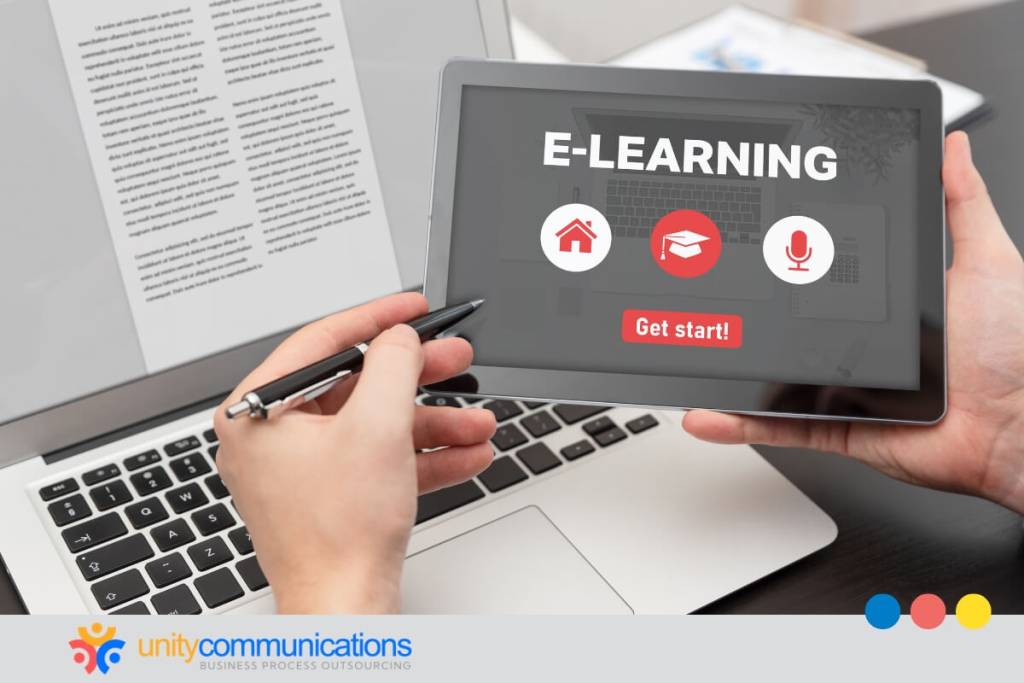IN THIS ARTICLE
Table of Contents
Similar to other sectors, education experiences constant innovation in operations and technologies. Chalk-and-board institutions now adopt digital classrooms and virtual training environments. This digitalization allows them to offer a flexible learning experience.
Amid this transformation, business process outsourcing (BPO) takes center stage in the e-learning sector. The approach offers scalable resources to help deliver online education cost-effectively.
Continue reading to learn how service providers revolutionize the learning process.
Why Educational Institutions Outsource E-learning Delivery

For an organization, the primary objective of outsourcing virtual learning delivery is to cut costs. Running a traditional educational institution consumes considerable resources, which does not even cover adding or transitioning to a virtual learning strategy.
Building a full-fledged e-learning application requires spending up to $200,000. But if you outsource this function, let us say to India, you need only pay $60,000 for a fully functioning app. This service package includes access to skilled developers and advanced technologies. It also involves software testing, maintenance, and support services.
As a result, educational institutions gain more time to focus on their primary mission—educating and empowering learners. Outsourcing lets these organizations concentrate on curriculum development, student engagement, and academic excellence.
How BPO Assists in Transforming the E-learning Landscape

In addition to the advantages outlined above, service vendors perform specific tasks to revolutionize online training and learning. They take over front- and back-office functions, allowing educational institutions to prioritize their core competencies.
Here’s what BPO’s role is in improving the e-learning experience.
Streamline Content Development and Improvement
Schools and training centers hire third-party companies to speed up content creation while ensuring high-quality virtual learning materials. Service providers develop interactive videos, animations, simulations, and other engaging visual assets to enable diverse learning styles. They use the following technologies to achieve these goals:
- Authoring tools (e.g., Articulate Storyline, Adobe Captivate, and Lectora)
- Content collaboration platforms (e.g., Google Workspace, Microsoft 365, and Slack)
- Video editing software (e.g., Adobe Premiere Pro, Camtasia, and iMovie)
- Graphic design tools (e.g., Adobe Photoshop, Canva, and Piktochart)
- Content management systems (e.g., WordPress, Joomla, and Drupal)
- Interactive quiz and assessment tools (e.g., Quizizz, Kahoot!, and Poll Everywhere)
- Screen recording software (e.g., OBS studio and Screencast-O-Matic)
- Feedback and survey tools (e.g., SurveyMonkey, Google Forms, and Typeform)
- Version control systems (e.g., GitHub and Bitbucket)
To accommodate students worldwide, BPO firms also help localize and globalize content. They translate and interpret these digital learning modules based on cultural and linguistic preferences.
Additionally, providers assist in monitoring and maintaining quality content. They optimize analytics tools to collect and evaluate student engagement data, work completion rates, and assessment scores. These insights enable them to provide recommendations on refining learning and teaching strategies.
Implement Cloud-based Learning Management Systems (LMS)
BPO organizations help educational institutions implement cloud-based LMS faster and more cost-effectively. This platform simplifies creating and managing online lessons, training courses, and quizzes.
LMS improves learning program effectiveness and employee retention. Higher education and K–12 sectors also adopt this infrastructure to foster active learning and personalization. However, traditional LMS solutions are costly. They require dedicated hardware, information technology (IT) staff, and ongoing maintenance for on-premises deployment.
Third-party service providers alleviate such expenses by eliminating the need for upfront hardware investments. They offer a subscription-based payment model to access a cloud-based LMS with the following benefits:
- Customize the e-learning platform according to an educational institution’s requirements
- Deliver quick remote learning support
- Scale e-learning resources based on changing student enrollment or course demands
- Allow for real-time analytics and reporting of student performance
- Facilitate automatic software updates and maintenance
- Provide omnichannel collaboration (e.g., online forums, live chat, and video conferencing)
- Execute robust security measures, such as data encryption and multifactor authentication
- Enable data backup and recovery features
Boost Customer Service
BPO contact and call centers are crucial to boosting consumer care in the e-learning and virtual training industries. They provide the enumerated services to increase customer satisfaction and ensure smooth online education delivery.
- Deliver 24/7 LMS support for students, instructors, and administrators. This round-the-clock assistance is especially vital for e-learning platforms catering to a global audience across different time zones.
- Provide omnichannel customer support. BPO firms use integrated communication channels to seamlessly engage with users. This approach lets learners select their preferred mode of communication, personalizing the experience.
- Execute prompt technical assistance. BPO agents assist in delivering a superior e-learning experience by quickly addressing software issues, such as login issues, glitches, or connectivity problems.
- Respond to registration and course navigation concerns. BPO call centers answer online course registration, enrollment, and payment inquiries. They also guide learners on how to maximize course materials within LMS.
- Collect and analyze LMS user feedback. Providers optimize the resulting insights to recommend ways to make the platform more user-friendly and enhance the overall quality of virtual training programs.
- Offer multilingual support. This crucial BPO call center job accommodates a diverse learning base. Providers deliver translation and interpretation services to meet students’ needs for online courses in their native language.
Will BPO Affect the Quality of Education?
BPO can impact the quality of education. However, whether its effects are positive or negative depends on several factors. These include the strategies used by the educational institution and its BPO partner.
Cutting expenses is a common motivation for outsourcing. Deloitte’s latest statistics show that 83% of companies achieved cost reductions from outsourcing in 2023 and will continue prioritizing it.
However, focusing too much on savings can tempt organizations to reduce hiring funds for experienced educators and instructional designers. Overreliance on third-party workers for content development may also result in unsatisfactory training and course resources.
Hence, e-learning organizations need to approach BPO strategically. They must highlight control over critical aspects of teaching and learning. For instance, an in-house team must join a BPO unit in module planning when outsourcing content development. This collaboration ensures the quality of e-learning materials remains exemplary.
The Bottom Line

BPO providers employ scalable human and tech resources to improve e-learning. They leverage these capabilities to ensure an unmatched virtual education experience.
But before reaping such benefits, note that you need to strike a balance between cost reduction and quality e-learning delivery. You must work closely with your provider to maximize your BPO investment and enhance your educational services.
Let’s connect if you seek a reliable BPO partner for cost-efficient customer service and technical support. Unity Communications has a flexible team and modern tools to help streamline the educational experience for your e-learners.





